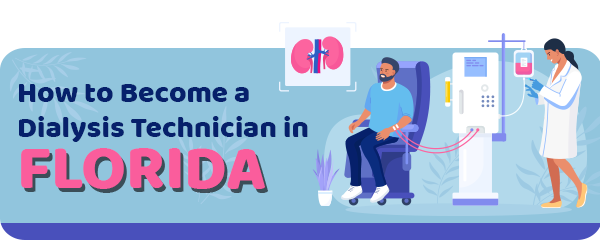The absence of dialysis machines and skilled operators could significantly shorten the lives of many individuals.
This underscores the crucial role of dialysis technicians in the healthcare industry.
While working with dialysis machines might not appear glamorous, it can be a fulfilling profession for those who are dedicated to helping others.
If you’re eager to learn more about this occupation, you’ve come to the right place, so read on!
Article Table of Contents
Dialysis Technician Job Description in Florida
Choosing a profession without understanding its responsibilities is not a wise decision.
To begin with, dialysis technicians in Florida work with patients who have kidney-related problems.
Their primary responsibility is to ensure the proper functioning of dialysis machines and operate them according to each patient’s specific needs.
Here are some additional duties associated with this profession:
- Monitoring the vital signs of patients
- Assisting patients throughout the dialysis procedure
- Ensuring patients are safe and comfortable
- Administering oxygen if deemed necessary
- Performing Basic Cardiopulmonary Resuscitation (CPR) if the situation demands it
- Reviewing a patient’s medical history to identify any concurrent conditions requiring attention during the procedure
- Making adjustments to the dialysis machines as necessary to accommodate each patient’s needs
These represent some of the most common responsibilities of dialysis technicians, although their day-to-day tasks may vary.
Dialysis Technician Requirements in Florida
In Florida, individuals pursuing a career as dialysis technicians operate under the jurisdiction of the private sector.
While there are no rigid training and certification prerequisites for dialysis technicians in the state, these professionals must adhere to guidelines established by the Centers for Medicare and Medicaid Services (CMS).
According to the CMS, prospective dialysis technicians in Florida should have:
- High school diploma or GED
- Completion of a training program
- Credentialing
- Competency Standards of Practice
- Licensure or certification
Certification must be obtained within 18 months of commencing employment.
Candidates can pursue nationally recognized certifications through examinations such as:
- The Nephrology Nursing Certification Commission (NNCC)
- Certified Clinical Hemodialysis Technician (CCHT) Exam
- The Board of Nephrology Examiners Nursing and Technology (BONENT)
- Certified Hemodialysis Technician (CHT) Exam
- The National Nephrology Certification Organization, Inc. (NNCO)
- Certified in Clinical Nephrology Technology (CCNT) Exam
- Certified in Biomedical Nephrology Technology (CBNT) Exam
The few regulations pertaining to this occupation in Florida originate from the Florida Board of Nursing, which includes passing both a written and practical examination.
Certified professionals must also complete continuing education courses every two years and pass a recertification exam every four years.
Dialysis Technician Training Schools in Florida
Dialysis technicians in Florida must undergo training before entering the workforce.
The first step is obtaining a high school diploma or GED, focusing on subjects such as biology, chemistry, medical terminology, anatomy, and physiology.
The formal training occurs in post-secondary educational institutions, including vocational schools, community colleges, or technical institutes.
During this training, students delve into topics like:
- Principles of dialysis
- Care of patients with kidney failure
- Possible complications of dialysis
- Water treatment and dialysate preparation
- Infection control
- Safety Dialyzer reprocessing
Completing an appropriate training program typically takes around one year.
Below, you can find a list of approved institutions offering dialysis technician courses in Florida.
Calhoun Community College 
Calhoun Community College offers a 50-hour training program, which can be completed through two options: online or in a traditional classroom setting.
For the online program, tuition is $1,299, and it includes e-books. Students have a 6-month period to complete this program.
The classroom option, priced at $999, also includes textbooks.
Classes for this option are held on Mondays and Wednesdays starting at 6 p.m.
Please note that refunds are only available for in-person classes.
Utopia Health Career Center 
From this career center, candidates will obtain a certificate as a hemodialysis technician, after 23 weeks of study.
This BONENT-approved course costs $3,575 and breaks down as follows:
- $200 registration, a fee that can’t be returned
- $500 down payment before the class starts.
- $125 x 23 weekly payments.
You could get a discount if you have the possibility of paying in full.
Alabama State University 
Alabama State University offers an online training program designed to prepare students for the Certified Hemodialysis Technicians (CHT) exam.
This is a test administered by the Board of Nephrology Examiners Nursing and Technology (BONENT).
This program is accessible to students from various states, contingent upon compliance with their respective state regulations.
The total tuition for this program is $4,190, which can be paid in installments.
Students have 12 months to complete the 205-hour program, even when progressing at their own pace.
Additionally, CPR training and certification, provided by the Red Cross, are included in the curriculum.
Course subjects encompass the cardiovascular system, urinary system, endocrine system, reproductive system, infection control, and principles of hemodialysis.
| School Name | Address |
|---|---|
| Utopia Health Career Center | 1248 S John Young Pkwy Kissimmee, FL 34741 |
| Alabama State University | online |
| Calhoun Community College | online |
Dialysis Technician Salary in Florida
Understanding your potential income is crucial when considering a career path.
Dialysis technicians typically begin at an entry-level position with an average annual salary of approximately $41,800 in Florida.
If you’re interested in knowing which cities in Florida offer higher salaries, please refer to the table below:
Annual Salary Range:| Location | Avg. Annual Salary |
|---|---|
| Belle Glade | $43,000 |
| Canal Point | $43,000 |
| Indiantown | $43,000 |
| Fort Lauderdale | $42,700 |
| Hollywood | $42,700 |
| Miami | $42,700 |
| Doral | $42,500 |
| Hialeah | $42,500 |
| Laurel | $41,900 |
| Nocatee | $41,200 |
Regional Salary in Florida
| Region | Employed | Avg. Annual Salary | Avg. Hourly Pay | Top 10% Annual Salary | Bottom 10% Annual Salary |
|---|---|---|---|---|---|
| Cape Coral-Fort Myers, FL | 690 | $66,520 | $31.98 | $96,990 | $38,950 |
| Crestview-Fort Walton Beach-Destin, FL | 160 | $60,830 | $29.24 | $84,510 | $34,740 |
| Deltona-Daytona Beach-Ormond Beach, FL | 670 | $55,480 | $26.67 | $80,500 | $33,280 |
| Gainesville, FL | 860 | $57,000 | $27.4 | $80,080 | $33,300 |
| Homosassa Springs, FL | 50 | $64,190 | $30.86 | $81,140 | $38,940 |
| Jacksonville, FL | 1,760 | $57,990 | $27.88 | $82,490 | $34,820 |
| Lakeland-Winter Haven, FL | 440 | $54,030 | $25.98 | $83,010 | $33,280 |
| Miami-Fort Lauderdale-West Palm Beach, FL | 6,960 | $62,220 | $29.91 | $86,700 | $35,540 |
| Naples-Immokalee-Marco Island, FL | 380 | $55,890 | $26.87 | $80,900 | $37,140 |
| North Port-Sarasota-Bradenton, FL | 480 | $59,630 | $28.67 | $82,490 | $35,560 |
| Ocala, FL | 200 | $48,770 | $23.45 | $78,460 | $31,200 |
| Orlando-Kissimmee-Sanford, FL | 2,490 | $55,090 | $26.48 | $83,120 | $34,190 |
| Palm Bay-Melbourne-Titusville, FL | 670 | $57,150 | $27.48 | $79,260 | $32,090 |
| Panama City, FL | 210 | $57,260 | $27.53 | $74,410 | $36,440 |
| Pensacola-Ferry Pass-Brent, FL | 520 | $57,890 | $27.83 | $79,520 | $34,280 |
| Punta Gorda, FL | 100 | $57,730 | $27.76 | $78,420 | $34,430 |
| Sebastian-Vero Beach, FL | 120 | $55,670 | $26.76 | $79,200 | $34,440 |
| Sebring, FL | 90 | $47,080 | $22.64 | $82,030 | $30,700 |
| Tallahassee, FL | 310 | $52,900 | $25.43 | $81,120 | $29,360 |
| Tampa-St. Petersburg-Clearwater, FL | 4,550 | $57,380 | $27.59 | $85,440 | $34,220 |
| The Villages, FL | 90 | $45,960 | $22.1 | $64,750 | $31,200 |
* Employment conditions in your area may vary.
Frequently Asked Questions
Do I need a license or a certification to work as a dialysis technician in Florida?
In Florida, individuals only need a certification recognized at the national level if they want to work as dialysis technicians.
Where Does a Dialysis Technician in Florida Find Work?
There are many different settings where a dialysis technician can find employment.
These next locations are the most common:
- Hospitals
- Dialysis centers
- Outpatient clinics
- Home healthcare agencies
Here are some examples:
- DSI Renal
- Florida Hospital
- Fresenius Medical Care
- Gambro Healthcare
- Gulf Coast Dialysis
- Orlando Health
- Jackson Health System
- Johnson Dialysis Center
- Naples Nephrology
- Kidney Kare
- Kidney Spa
Which Other Skills Are Required for a Dialysis Technician in Florida?
Dialysis techs must possess a series of skills and abilities.
These include:
- Attention to details
- Excellent communication
- Empathy
- Patience
- Compassion
- Technical mind
Read the full guide: How to Become a Dialysis Technician



